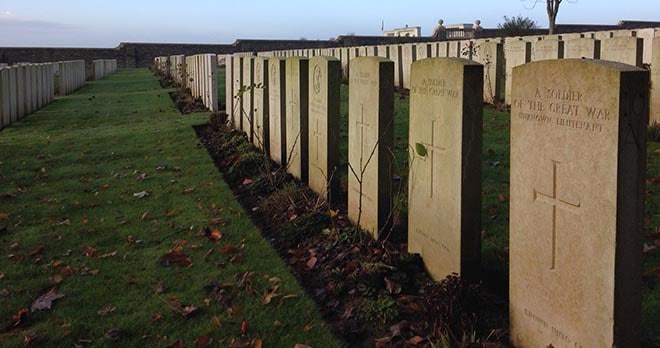It’s time our military’s mesothelioma warriors were properly honoured, too

It’s 100 years since the armistice brought WW1 to an end. In poignant and moving ceremonies yesterday many thousands gathered to remember those whose lives were cut short, or who were affected by physical or mental injuries sustained during their armed service.
Anyone who has ever visited the WW1 cemeteries in Flanders is shocked by the enormity of the loss, which is simply too huge to comprehend. On the bloodiest single day of the conflict, 1 July 1916, over 19,000 British troops lost their lives in the doomed offensive that marked the beginning of the battle of the Somme.
It is only right and proper that we all should pause and pay tribute.
There is, however, one group of ex-servicemen who are continuing to die even now, as a result of serving their country, but whose names do not appear on any war memorial, roll of honour, or on the commemorative wall of the Falkland Islands memorial chapel at Pangbourne. The numbers affected are continuing to grow, so much so that Helen Wilkes – a specialist nurse – was recently appointed in Southampton to help and advise them. These ex-servicemen are those whose duties brought them into contact with asbestos, and who are now going on to develop mesothelioma many decades later.
We are proud to be helping Mesothelioma UK in their support of these veterans. The impact of a mesothelioma diagnosis is devastating. Whilst treatments can hold the illness in check, there is still no cure.
The inequities of the current system for veterans
Veterans diagnosed with mesothelioma were eligible for a War Disablement Pension, but given their very limited life expectancy following the development of mesothelioma this was felt to be unfair, and in 2016 it was announced they could elect instead for a lump sum of £140,000.
Whilst this was a welcome step, it does not go far enough. With what feels like increasing numbers of people being diagnosed in their 60s or even younger, £140,000 will leave their loved ones without the financial support they deserve. It also only applies to mesothelioma, meaning that anyone diagnosed with asbestos related lung cancer, asbestosis, or pleural thickening has no recourse if those illnesses have arisen as a result of work in the services before 1987. Those who were exposed to asbestos after 1987 and who go on to develop any asbestos related illness can pursue the Ministry of Defence (MOD) for compensation in the same way as any other employer.
Perhaps most unjust of all, however, is the fact that those who develop mesothelioma after pre -1987 exposure to asbestos in the forces will only be eligible to receive £140,000. This means that they are very unlikely to receive promising new treatments like immunotherapy, as the drugs are not yet available on the NHS, and a 2 year course of treatment would cost more than double the £140,000 lump sum to which these veterans are entitled. This creates an unfair two-tier system. Immunotherapy can dramatically improve the prognosis for those with mesothelioma, like the wonderful Meso Warrior Mavis Nye, who first started to receive Keytruda as part of a clinical trial in 2013, when she was already desperately unwell after battling mesothelioma for 4 years.
[caption id="attachment_43354" align="alignleft" width="300"] From left to right: Jenifer Seavor, Harry Steinberg QC, Helen Childs, Mavis Nye, Ray Nye, Rachel James[/caption]
From left to right: Jenifer Seavor, Harry Steinberg QC, Helen Childs, Mavis Nye, Ray Nye, Rachel James[/caption]
There are other inequities though. For example, those who served alongside the armed forces in civilian roles like the Royal Fleet Auxiliary are able to pursue the MOD for compensation even if their exposure to asbestos was before 1987. Similarly, the family members of armed forces personnel who were secondarily exposed to asbestos by – for example – laundering work clothes pre 1987 can also pursue the MOD direct, including for the cost of immunotherapy and other non-NHS treatments. Likewise those who came into contact with asbestos after 1987. These cases illustrate why it is so important to seek specialist legal advice. All individuals deserve the best possible treatment, and so do those veterans who were only exposed to asbestos in the armed forces before 1987.
Medics involved in the treatment of those with mesothelioma hope that some of the immunotherapy drugs that are currently in clinical trials will be licensed for use by the NHS in the relatively near future. In the meantime it can only be right and just that immunotherapy and other non NHS treatment should be available to all those affected by mesothelioma. It would be a very fitting tribute if those armed forces personnel who are only eligible for the MOD lump sum could also be guaranteed access to the best possible treatment.
The legacy of asbestos use in the UK still persists, as the numbers of those diagnosed with mesothelioma continues to rise. To put the impact of mesothelioma into context, since Prince William married Kate Middleton in April 2011, more people have died from mesothelioma in the UK than were killed across 15 miles of the western front on that first day of the battle of the Somme.